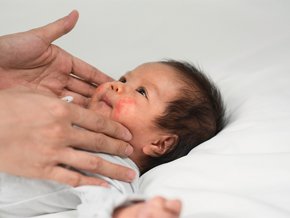
Scientists looked at magnetic resonance imaging (MRI) data from three groups of healthy children. They found that babies born by C-section had less white matter and less myelination in their brains in early childhood compared to those born vaginally.1

How C-section may affect brain development
One reason for the differences in white matter could be the bacteria they are exposed to. When babies are born vaginally, they are exposed to bacteria from their mother’s birth canal, which is important for their immune system.2
However, C-section babies are exposed to bacteria similar to those found on the skin, which is not as beneficial. This can affect the development of the baby’s immune system and microbial flora. Moreover, the researchers say that the quality of bacteria in a newborn’s gut affects immune activation and the development of neural pathways, which are crucial for brain development.1
If a C-section delivery is medically necessary, what is the best way to support brain development? The answer lies in a process that occurs in the brain called Myelination.
Myelination and brain development
Myelination is a process that happens in the brain, where the growth of white matter occurs. It can be likened to coating a wire with insulation.
Think of the nerves in the brain as wires that carry messages in the body. Just like how a wire can transmit electricity more efficiently when it’s covered in insulation, the brain’s nerve cells work better when wrapped in a coating called myelin, a lipid-rich substance. This myelin sheath acts like the insulation on a wire, helping the messages travel faster and more efficiently along the nerve, just as insulation helps electricity flow smoothly along a wire. So, myelination is crucial for quick and efficient thinking, feeling, and movement.
Myelination also plays a significant role in language acquisition in young children. A separate study has demonstrated that the higher the myelination, the better the language acquisition. The study also found that the characteristic rapid development in toddlers’ vocabulary occurs only after myelination occurs in the brain.2
Meanwhile, the opposite, impaired myelination or damaged myelin, is associated with cognitive deficits.
Supporting myelination
The good news is that certain nutrients can support myelination in C-section babies. According to the researchers, breastfeeding could offset brain differences caused by cesarean delivery. But what nutrients in breast milk are crucial to supporting myelination?
The five major phospholipids present in human milk are vital for brain development 4. Specifically, two of the five major phospholipids—phosphatidylcholine and sphingomyelin—are critical in supporting myelination.3
The study investigated MRI data among infants, and those who consumed milk with phospholipids, also found in breast milk, were shown to increase myelination by up to 36%.3
Besides boosting C-section babies’ nutrition, the researchers noted that environmental influence could help support myelination. For example, brain development in healthy children has been associated with sleep duration. Reduced night awakenings at six months and significantly increased day sleep at 12 months may be linked to better learning and memory consolidation.3
Although C-section delivery may impact myelination, which can affect babies’ cognitive and behavioral functioning, it’s not too late. Myelination can be supported by breastfeeding or drinking milk with phospholipids, as well as sleep. By supporting babies’ nutrition and supplementing that with good quality sleep, brain development in C-section babies can catch up with vaginally delivered babies in the first few years of life.
References:
1. S.C. Deoni, et al. Cesarean delivery impacts infant brain development. American Journal of Neuroradiology, January 2019. Pages 169-177.
2. Pujol J, Soriano-Mas C, Ortiz H, et al. Myelination of language-related areas in the developing brain. Neurology 2006, 66:339-343.
3. Schneider N, Bruchhage BMK, O’Neil BV, et al. A nutrient formulation affects developmental myelination in term infants: a randomized clinical trial. Front Nutr. 2022;9:823893. doi: 10.3389/fnut.2022.823893
4. Marina Schverer, Siobhain M. O'Mahony, Kenneth J. O’Riordan, Francisco Donoso, Bernard L. Roy, Catherine Stanton, Timothy G. Dinan, Harriët Schellekens, John F. Cryan,Dietary phospholipids: Role in cognitive processes across the lifespan, Neuroscience & Biobehavioral Reviews,Volume 111,2020, Pages 183-193,ISSN 0149-7634,




























